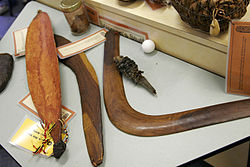AY Honors/Aboriginal Lore/Answer Key
- For the town and rocket launch site, see Woomera, South Australia.
- For the Immigration Centre see Woomera Immigration Reception and Processing Centre.
A woomera is an Australian Aboriginal spear-throwing device. It has been described as "the most efficient spear-throwing device ever"&. Similar to an atlatl, it enables a spear to travel much further than arm strength alone. It is still used today in some remote areas of Australia. The name woomera comes from the Eora people who were the original inhabitants of the Sydney area. It has a similar function to the Native American atlatl but uses different construction methods and materials.
As with spears and boomerangs, woomera were traditionally only used by men. Some woomeras, especially those used in the Central and Western Australian deserts, were multi-purpose tools. They were often shaped like long narrow bowls and could be used for carrying water-soaked vegetable matter (which could later be sucked for its moisture, but wouldn't spill) as well as small food items such as little lizards or seeds. Many woomeras had a sharp stone cutting edge attached to the end of the handle with black gum from the spinifex plant. This sharp tool had many uses – and was commonly used for cutting up game or other food, cutting wood, and so on. The woomera could be used as a shield for protection against spears and boomerangs. Some boomerangs were deliberately made with a hook at one end designed to catch onto the edge of a woomera or shield, which then caused the boomerang to swivel around and hit the enemy.
The woomera was traditionally decorated with incised or painted designs which gave a good indication of the owner's tribal or clan group.
In the Arrernte language the device is called a Amirre.
External links
- ↑ http://[Graham Pearcey, on ABC Radio National 7 June 1988 www.abc.net.au/rn/science/ockham/stories/s11117.htm]
- Aboriginal technology
- A drawing of a woomera, from the book Boy Scouts Beyond the Seas: "My World Tour" by Sir Robert Baden-Powell, 1913

